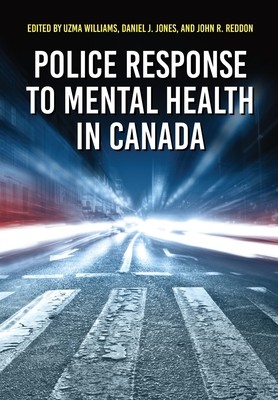
- We will send in 10–14 business days.
- Publisher: Canadian Scholars' Press Inc.
- Year: 2019
- Pages: 338
- ISBN-10: 1773381458
- ISBN-13: 9781773381459
- Format: 17 x 24.4 x 1.9 cm, minkšti viršeliai
- Language: English
- SAVE -10% with code: EXTRA
Police Response to Mental Health in Canada (e-book) (used book) | bookbook.eu
Reviews
Description
The overwhelming majority of police calls involve individuals with mental health experiences and yet limited resources exist to prepare first responders for these interactions. Police Response to Mental Health in Canada addresses this gap in the field, providing practical guidance to police studies students on how best to respond to mental health-related calls in both critical and non-critical situations.In addition, this book focuses on the mental health of policing professionals by addressing common mental health symptoms and providing strategies to improve the mental health wellness of policing professionals.
Aligned with the Diagnostic and Statistical Manual of Mental Disorders, Fifth Edition, (DSM-5) criteria, this text provides in-depth explanations of the mental health conditions commonly encountered in policing, including mood, psychosis, personality, substance abuse, and post-traumatic stress disorders. Written in an accessible style, this book includes pedagogical tools such as scenario-based learning, case studies, reflection questions, group activities, and chapter summaries to reinforce the learning objectives outlined at the start of each chapter.
With the increasing demand for law enforcement officials to be better informed and prepared to interact with those experiencing mental health issues, this is a timely resource for students in college and university police studies programs.
FEATURES:
- Learning objectives, case studies, and discussion questions
- Contributions from leaders in fields of health services, psychology, criminology, policing, and corrections
- Discussion of Canadian issues that are relevant across the country, including police relations with Indigenous populations and incidents of gang-related violence
EXTRA 10 % discount with code: EXTRA
The promotion ends in 21d.13:25:01
The discount code is valid when purchasing from 10 €. Discounts do not stack.
- Publisher: Canadian Scholars' Press Inc.
- Year: 2019
- Pages: 338
- ISBN-10: 1773381458
- ISBN-13: 9781773381459
- Format: 17 x 24.4 x 1.9 cm, minkšti viršeliai
- Language: English English
The overwhelming majority of police calls involve individuals with mental health experiences and yet limited resources exist to prepare first responders for these interactions. Police Response to Mental Health in Canada addresses this gap in the field, providing practical guidance to police studies students on how best to respond to mental health-related calls in both critical and non-critical situations.In addition, this book focuses on the mental health of policing professionals by addressing common mental health symptoms and providing strategies to improve the mental health wellness of policing professionals.
Aligned with the Diagnostic and Statistical Manual of Mental Disorders, Fifth Edition, (DSM-5) criteria, this text provides in-depth explanations of the mental health conditions commonly encountered in policing, including mood, psychosis, personality, substance abuse, and post-traumatic stress disorders. Written in an accessible style, this book includes pedagogical tools such as scenario-based learning, case studies, reflection questions, group activities, and chapter summaries to reinforce the learning objectives outlined at the start of each chapter.
With the increasing demand for law enforcement officials to be better informed and prepared to interact with those experiencing mental health issues, this is a timely resource for students in college and university police studies programs.
FEATURES:
- Learning objectives, case studies, and discussion questions
- Contributions from leaders in fields of health services, psychology, criminology, policing, and corrections
- Discussion of Canadian issues that are relevant across the country, including police relations with Indigenous populations and incidents of gang-related violence


Reviews